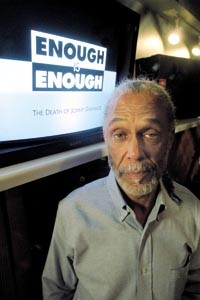Nearly 13 years after Jonny Gammage was killed by police in a "routine" traffic stop and Jerry Jackson was shot to death by police in the Armstrong Tunnel, the subject of police and community relationships in Pittsburgh still raises hackles. The two black men's deaths at the hands of white police officers have been touchstones for controversies surrounding race and policing.
On Fri., May 9, Billy Jackson's documentary "Enough is ENOUGH: The Death of Jonny Gammage" screens on WQED at 10 p.m. The film, a version of which was first shown in 2005 to commemorate 10 years since Gammage's death, is making its television debut. It explores the controversy surrounding the killings and the aftermath; a videotaped panel discussion will air after the film.
After the broadcast, viewers will be directed to Jackson's Web site, www.NOMMOproductions.com, and asked to complete a survey, giving their reactions to the film and thoughts on police and community relations. The results, says Jackson, will be compiled and distributed to policy makers and the media.
Ideally, Jackson says, seeing the movie will help people become "informed, involved, and eventually bring about change. Change is going to have to happen from without," because it won't come from within, he says. Lack of transparency in police management and supervision, he says, are why the two deaths happened -- and why, in the view of Jackson and others, justice was never served.
The movie, narrated by Danny Glover, includes re-enactments and interviews with local and national experts, families of the dead men, activists and officials. It also includes footage from community protests.
In 1995, when both killings took place, filmmaker Jackson was running a project called Community Media, which had many youth interns filming community actions. They collected footage after Gammage was killed, which became the germ of the documentary.
Gammage died on Oct. 12, 1995, from positional asphyxia after he was stopped by suburban police officers. Gammage had been driving along Route 51 in a Jaguar belonging to his cousin, Steeler Ray Seals, when he was pulled over. During the subsequent arrest, officers crushed his neck and chest in subduing him.
A jury at a coroner's inquest recommending that homicide charges be filed against all five of the officers directly involved: Baldwin Borough patrolman Michael G. Albert, Brentwood Lt. Milton Mulholland, Brentwood patrolman John Vojtas and Sgt. Keith Henderson and patrolman Shawn Patterson, both of the Whitehall force.
The defense claimed the officers were only acting according to their training, says coroner's jury foreman Richard Lyons during an interview in the film. "Nobody's taught to beat the heck out of somebody like that," Lyons says.
None of the officers were convicted, however. Only three -- Mulholland, Albert and Vojtas -- were charged with involuntary manslaughter. Vojtas was found not guilty by an all-white jury. After the first trial ended in a mistrial, the new jury deadlocked on charges on Albert and Vojtas. The sole holdout -- also the sole black person on the jury -- was Walter Moorefield.
"They had pictures of him," says a visibly shaken Moorefield in the film. "I mean, Jesus Christ." A third trial was ruled out as double jeopardy, and the officers were never convicted.
Jerry Jackson died in a hail of bullets in the Armstrong Tunnels April 6, 1995, after leading police on a high-speed chase in a stolen car. Housing Authority officer John Charmo served a year in prison for involuntary manslaughter in the case.
"In many ways, Charmo was more disturbing than the Gammage situation," Vic Walczak, legal director of the Greater Pittsburgh chapter of the ACLU, says in the film. "The whole story the police officers concocted was a lie."
Charmo claimed that Jackson spun his car around in the tunnel, and was using it as a deadly weapon, which necessitated Charmo shooting him. Video from the tunnel and reports on tracks of engine fluid from the car and gouge marks proved that no U-turn took place, nor could it have. But those pieces of evidence were not presented during the initial inquest.
"When an alleged 'outside investigation' is being done of city police, it's very often being done by the ultimate insider," says former FOP vice president Chuck Bosetti, a frequent and vocal critic of departmental policies. "In the Charmo case, one of the detectives who was in the tunnel in 1995 retired, began working for the county district attorney, and in 1998 was literally investigating his own actions when the Charmo case was reopened."
Filmmaker Jackson says that while some strides have been taken -- notably, the formation by voter mandate of the Citizen Police Review Board and the consent decree that oversaw the department -- justice has not been served.
However, at least one panelist in the discussion after the film says there was some justice: "Officer Charmo was convicted of homicide," says Tom Farrell, a criminal defense attorney. "To incarcerate a police officer sends a strong message."















